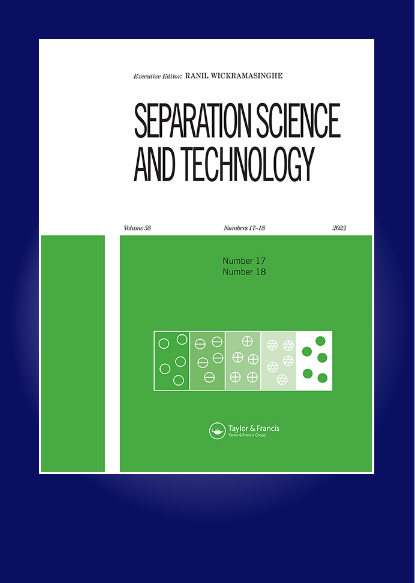Hybrid biosorbents from exopolymeric substances immobilized in Ca-alginate and their biosorption mechanisms in single and multi-metal systems
IF 2.3
4区 工程技术
Q3 CHEMISTRY, MULTIDISCIPLINARY
引用次数: 0
Abstract
ABSTRACT This study developed a hybrid biosorbent consisting of exopolymeric substances (EPS) from Bacillus cereus immobilized in the gelling agent Ca-alginate. Metal removal tests revealed that the hybrid EPS beads showed significantly higher metal removal compared to plain alginate beads. This higher removal efficacy in hybrid biosorbents was attributed to the increased number of functional groups detected via FTIR analysis. Hybrid EPS beads bind metals via the formation of strong covalent bonds (chemisorption), rather than through weak van der Waals forces (physisorption), complying with the pseudo-second order model. This was consistent in both single and multi-metal systems. For adsorption isotherm, metal removal (pH 5, 25ºC, 120 rpm) by hybrid biosorbents in single metal systems fits the Langmuir isotherm (monolayer adsorption). In multi-metal systems, however, the removal of Zn and Cd demonstrated a better fit to the Freundlich isotherm (multilayer adsorption) compared to the typical Langmuir isotherm (for Cu, Pb and Cr). The isotherm models indicated that the maximum biosorption capacity for Cu, Pb, Zn, Cd and Cr was at 34.97, 156.24, 19.19, 11.66 and 38.61 mg g−1, respectively. The hybrid EPS beads are superior for the biosorption of Cu, Pb and Cr compared to existing biosorbents.海藻酸钙固定化外聚物的杂化生物吸附剂及其在单金属和多金属体系中的生物吸附机理
摘要:本研究将蜡样芽孢杆菌的外聚合物质(EPS)固定在海藻酸钙胶凝剂中,制备了一种杂化生物吸附材料。金属去除试验表明,与普通海藻酸盐珠相比,杂化EPS珠具有显著更高的金属去除率。混合生物吸附剂的高去除效果归因于通过FTIR分析检测到的官能团数量的增加。杂化EPS微珠通过形成强共价键(化学吸附)结合金属,而不是通过弱范德华力(物理吸附),符合伪二阶模型。这在单金属和多金属体系中都是一致的。对于吸附等温线,混合生物吸附剂在单金属系统中去除金属(pH 5, 25ºC, 120 rpm)符合Langmuir等温线(单层吸附)。然而,在多金属体系中,与典型的Langmuir等温线(Cu, Pb和Cr)相比,Zn和Cd的去除更符合Freundlich等温线(多层吸附)。等温线模型表明,对Cu、Pb、Zn、Cd和Cr的最大吸附量分别为34.97、156.24、19.19、11.66和38.61 mg g−1。与现有的生物吸附剂相比,杂化EPS珠对Cu、Pb和Cr的生物吸附效果更好。
本文章由计算机程序翻译,如有差异,请以英文原文为准。
求助全文
约1分钟内获得全文
求助全文
来源期刊

Separation Science and Technology
工程技术-工程:化工
CiteScore
6.10
自引率
3.60%
发文量
131
审稿时长
5.7 months
期刊介绍:
This international journal deals with fundamental and applied aspects of separation processes related to a number of fields. A wide range of topics are covered in the journal including adsorption, membranes, extraction, distillation, absorption, centrifugation, crystallization, precipitation, reactive separations, hybrid processes, continuous separations, carbon capture, flocculation and magnetic separations. The journal focuses on state of the art preparative separations and theoretical contributions to the field of separation science. Applications include environmental, energy, water, and biotechnology. The journal does not publish analytical separation papers unless they contain new fundamental contributions to the field of separation science.
 求助内容:
求助内容: 应助结果提醒方式:
应助结果提醒方式:


